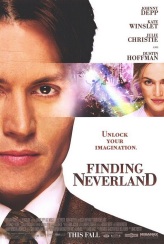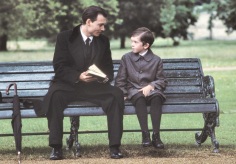| Finding Neverland |
| |
 |
UK/USA, 2004. Rated PG.
96 minutes.
Featuring:
Johnny Depp, Kate Winslet, Dustin Hoffman, Julie Christie, Radha Mitchell, Kelly MacDonald, Ian Hart, Eileen Essell, Paul Whitehouse, Freddie Highmore, Joe Prospero, Nick Roud, Luke Spill, Mackenzie Crook
Writer: David Magee, based on the
play “The Man Who Was Peter Pan,” by Allan Knee
Original Music:
Jan A.P. Kaczmarek
Cinematography: Roberto Schaefer
Producers: Richard N. Gladstein, Nellie Bellflower
Directors: Mark Forster
LINKS |
 nquestionably, any list of the the greatest works of children's literature has to include Peter Pan. Written as a play in 1904 and later a novel in 1911 by Scottish-born author JM Barrie (already a successful, respected author of adult material), Peter Pan is a long-lived sensation, with thousands of theatrical stagings and dozens of films and television productions to its credit. Even the name “Wendy,” invented by Barrie, has entered into common use. His story, which teaches children to believe in the power of imagination and pleads with adults not to force youngsters to grow up too fast, strikes a universal chord.
nquestionably, any list of the the greatest works of children's literature has to include Peter Pan. Written as a play in 1904 and later a novel in 1911 by Scottish-born author JM Barrie (already a successful, respected author of adult material), Peter Pan is a long-lived sensation, with thousands of theatrical stagings and dozens of films and television productions to its credit. Even the name “Wendy,” invented by Barrie, has entered into common use. His story, which teaches children to believe in the power of imagination and pleads with adults not to force youngsters to grow up too fast, strikes a universal chord.
So, what of the man behind Peter Pan? Surely he must have been a fascinating character. Surely, unlocking his mind must be as wondrous a journey as flying off to Peter Pan's magical home of Neverland. Surely the film Finding Neverland must truly “unlock the imagination,” as it promises in the tagline.
Well…kinda, sorta.
Finding Neverland is a pleasing enough experience, successfully yanking on a few heartstrings and engaging in a few fanciful flourishes, but it doesn't find that enchanted realm at the end of the rainbow, or wherever Neverland is. The film is inventive, but not wildly so—not enough to shake it free of British costume drama conventions. Finding Neverland is just a fictionalized account of Barrie's creation of the play, made slightly less traditional by the presence of intermittent fantasy sequences set in the worlds children imagine when they play.
When we meet Barrie (Johnny Depp), he anxiously awaits the debut of his latest play. The curtain rises, and within seconds, he correctly determines from audience reactions that his work is a failure. This sets him looking for a new source of inspiration, which he finds under a bench in the park, where a young boy, Peter (Freddie Highmore), pretends to be trapped in a dungeon. Not having children of his own, Barrie is immediately fascinated by Peter and his three brothers, and when he meets their gorgeous mother, the young widow Sylvia Llewelyn Davies (Kate Winslet), he is drawn to them all the more. Barrie becomes the family's surrogate father, and his relationship with the boys forms the basis of Peter Pan. The trouble is, Barrie is already married, and his wife Mary (Radha Mitchell) doesn't take kindly to his devotion to another woman's family. Similarly, Sylvia's mother (Julie Christie) doesn't take kindly to having a slightly odd married man coming round. And, as often happens in movies of this kind, tragedy awaits to complicate things even further. Except it doesn't. It actually simplifies things, allowing the film to wrap itself up nice and neatly.

Johnny Depp and Freddie Highmore bond in the park in Finding Neverland. |
Depp, the former pouty poster boy, has consciously shunned superstardom and become a master of playing the eccentric—which has now made him a superstar anyway. However, he is also a subtle actor, avoiding pitfalls of cliché and exaggeration in Finding Neverland, where it would be wholly inappropriate. There is no sign of Captain Jack Sparrow when Depp plays pirates with the Llwelyn Davies children, nor is there any hint of Secret Window's crazy Mort Rainey when Depp does the flaky writer thing. Always Depp avoids falling back on what's been done before.
The same cannot be said about the film. Finding Neverland limits itself to assigning meaning to Peter Pan based on fictional situations, and wringing its hands over how difficult it is for writers to live with people who just don't get them. (A common theme in films—could it be because they're written by writers?) The movie does these things well enough to deliver an emotionally satisfying conclusion, but it declines the opportunity to do more. Look at the actual story of JM Barrie and Peter Pan, and it's obvious the film has unforgivably simplified matters. In real life, Sylvia was not yet a widow when Barrie entered her life, and two of her five children (not four) were yet to be born. Yet Barrie still traveled with them on holidays and paid the children's private school tuitions. Weird, right? Also, there was no looming tragedy at the time Peter Pan (the play) was conceived. That came years later, when Barrie produced the novel. (For the record, however, biographers agree that nothing improper between Barrie and his underage Muses ever occurred, or was even contemplated, which is likely more than Lewis Carroll can say.)
Director Marc Forster makes his points effectively. We see the inability of adults to engage children at their own level or treat them with respect, and how Barrie navigates this obstacle to make his play a success—notwithstanding the skepticism of his loyal financier, Charles Frohman (Dustin Hoffman, who appeared in his own Peter Pan adaptation, the appalling Hook). There are fun fantasy sequences with the children, particularly the first one (in which Barrie dances with his dog), though the later ones are less ingenious. Forster avoids demonizing Barrie's wife, and even sympathizes with her. To emphasize the barrier between them, there is an effective stylistic frill when Barrie approaches his wife's door, then thinks better of knocking. The camera then shoots under the door in a single motion (or appears to), and finds Mary listening to her husband retreating, with both yearning and distress on her face.
Finding Neverland flirts with complexity but never goes all the way. It celebrates the power of imagination, but errs by leaving too much of the characters' inner thoughts and motivations to the audience's imagination. The story is therefore not quite gritty or complicated enough to be memorably dramatic, and not quite inspired enough to take flight. The result is a rather simple film that works as far as it goes, but no farther.
Review
© November 2004 by AboutFilm.Com and the author.
Images © 2004 Miramax. All Rights Reserved.


